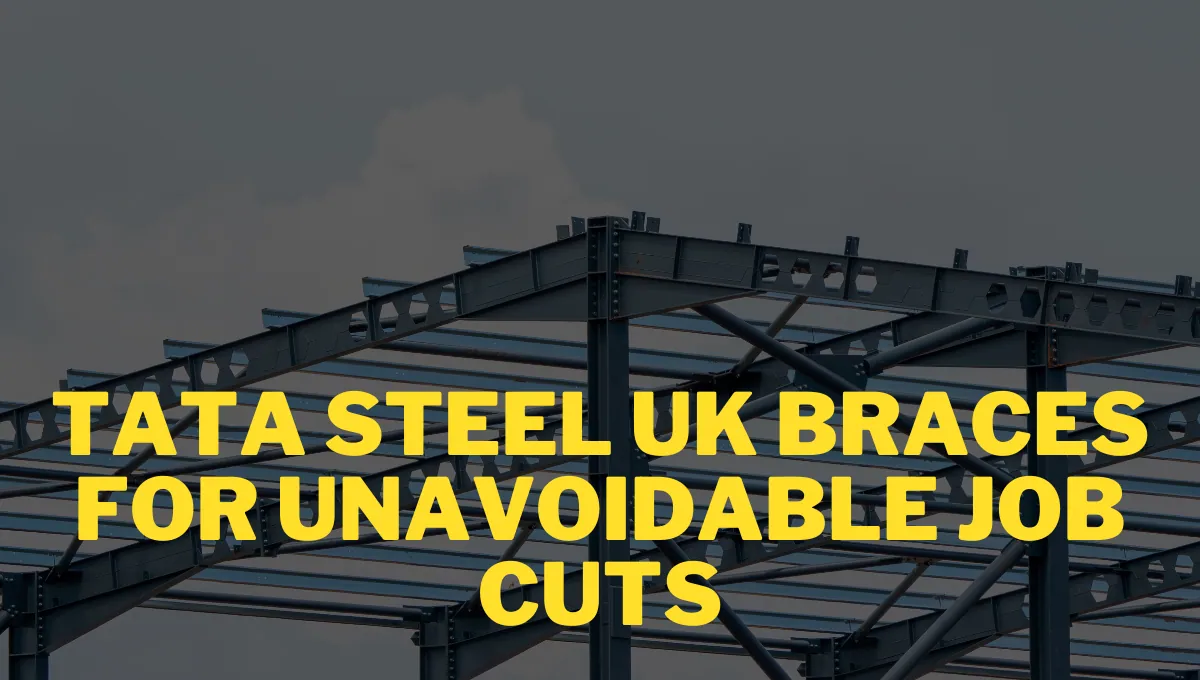Tata Steel, a major player in the global steel industry, has announced impending job cuts at its UK operations.
According to the company’s CEO, T V Narendran, around 2,500 workers will be affected as the company undergoes a significant transition.
This move, described as “inevitable” by Narendran, has sparked concerns and protests among workers’ unions in the UK.
Context of Job Cuts
Reasons for the Job Cuts
The job cuts at Tata Steel’s UK operations are primarily driven by the company’s strategic transition to more sustainable production methods.
Tata Steel is shifting from the traditional blast furnace route to the low-emission electric arc furnace (EAF) process.
This transition is a part of the company’s broader efforts to reduce carbon emissions and align with global environmental standards.
Criticism and Protests
The announcement of job cuts has led to criticism from workers’ unions and has triggered ongoing protests.
Workers’ unions are concerned about the significant impact on employment and the livelihoods of thousands of employees.
These protests reflect the broader anxiety about job security and the economic implications of the transition for workers and their families.
Tata Steel’s Operations in the UK
Port Talbot Steelworks
Tata Steel operates the largest steelworks in the UK, located in Port Talbot, South Wales.
This facility has a production capacity of 3 million tonnes per annum and is a critical component of Tata Steel’s operations in the country.
The Port Talbot steelworks is renowned for its significant contribution to the UK’s steel production and its strategic importance in the industry.
Employment Impact
Tata Steel employs approximately 8,000 people across its operations in the UK. The planned job cuts will affect around 2,500 workers, which is a significant portion of the workforce.
This reduction is part of the company’s efforts to streamline operations and enhance competitiveness in a challenging economic environment.
Transition to Electric Arc Furnace (EAF) Process
Environmental Goals
One of the key drivers behind the transition to the EAF process is Tata Steel’s commitment to reducing carbon emissions.
The EAF process is more environmentally friendly compared to the traditional blast furnace method.
By adopting this process, Tata Steel aims to significantly lower its carbon footprint and contribute to global efforts to combat climate change.
Government Support
The transition to the EAF process is being supported by the UK government. In September 2023, Tata Steel and the UK government reached a mutual agreement on a joint investment plan totaling £1.25 billion.
The UK government contributed £500 million towards this investment. This financial support underscores the importance of the transition for the UK’s environmental and industrial policies.
Benefits of the Transition
According to CEO T V Narendran, the transition to the EAF process, supported by government aid, will make Tata Steel more competitive by reducing production costs.
Additionally, the shift is expected to result in a reduction of 5 million tonnes of CO2 emissions per year.
These benefits align with Tata Steel’s strategic goals of enhancing sustainability and operational efficiency.
Financial Performance
Recent Financial Results
Tata Steel reported a significant decline of 64.59% in its consolidated net profit for the January-March quarter of the 2023-24 financial year.
The profit stood at ₹554.56 crore, compared to ₹1,566.24 crore in the same period the previous year.
This decline has been attributed to lower realizations and expenses on certain exceptional items.
Financial Challenges
The drop in net profit highlights the financial challenges faced by Tata Steel.
The company is navigating a complex economic landscape characterized by fluctuating steel prices, high production costs, and the need for substantial capital investments to support the transition to sustainable production methods.
These challenges underscore the importance of strategic planning and financial management in ensuring the company’s long-term viability.
Implications of Job Cuts
Economic Impact
The job cuts at Tata Steel’s UK operations will have significant economic implications. The loss of around 2,500 jobs will affect not only the employees but also the broader community.
The reduction in workforce will likely lead to decreased household incomes, increased unemployment, and potential economic downturns in regions heavily dependent on Tata Steel’s operations.
Social Impact
The social impact of the job cuts is substantial. Employees facing job losses will need to seek alternative employment opportunities, which may not be readily available.
The uncertainty and stress associated with job loss can have adverse effects on mental health and well-being.
Additionally, the protests and unrest among workers’ unions reflect the social tensions arising from such significant workforce reductions.
Long-term Implications
In the long term, the job cuts and transition to the EAF process will shape Tata Steel’s operational landscape.
While the immediate impact is challenging, the shift towards more sustainable production methods positions Tata Steel to meet future environmental regulations and market demands.
However, the company must balance these strategic goals with the need to support affected employees and maintain positive labor relations.
Conclusion
Tata Steel’s announcement of unavoidable job cuts in its UK operations marks a significant moment in the company’s history.
Driven by the need to transition to more sustainable production methods, the company faces the dual challenge of reducing its workforce while enhancing its competitiveness and environmental credentials.
The support from the UK government and the strategic shift to the EAF process highlights Tata Steel’s commitment to long-term sustainability.
However, the immediate economic and social implications of the job cuts underscore the need for careful management and support for affected employees.
As Tata Steel navigates this complex transition, the outcomes will be closely watched by industry stakeholders, employees, and the broader community.
